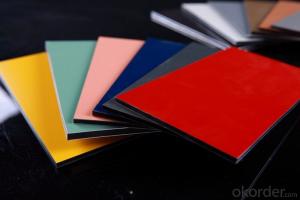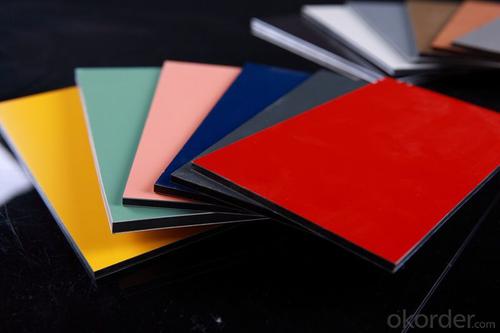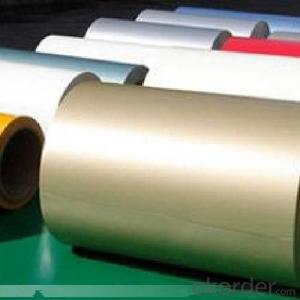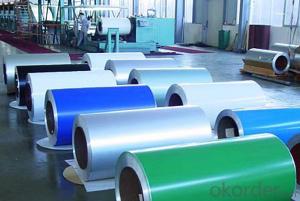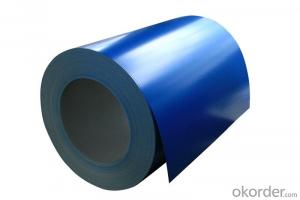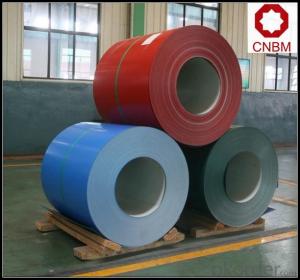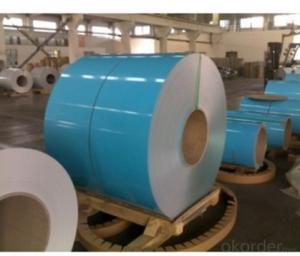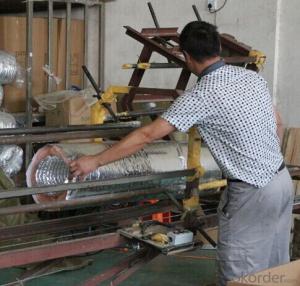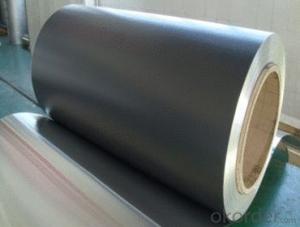Wholesale Roofing Aluminum Coil - Aluminium Coil with PVDF Coating Good Quality
- Loading Port:
- Shanghai
- Payment Terms:
- TT OR LC
- Min Order Qty:
- 8 m.t.
- Supply Capability:
- 2000 m.t./month
OKorder Service Pledge
OKorder Financial Service
You Might Also Like
Specification
Structure of Aluminium Coil with PVDF Coating Good Quality:
Coated aluminum coil/sheet are of a wide range of colors, which gives wonderful appearance no matter in residential and commercial constructions of great exhibition centers.
The coated aluminum coil/sheet have been widely used in the fields of construction and decoration( garage doors, ceiling etc.), electronic appliances, lighting decoration, air-condition air pipes, sandwich panels and drainages etc.
Main Features of Aluminium Coil with PVDF Coating Good Quality:
1) High flexibility
2) Impact resistance
3) Excellent weather-proof durability
4) Anti-ultraviolet
5) High erosion resist
Images of the Aluminium Coil with PVDF Coating Good Quality:
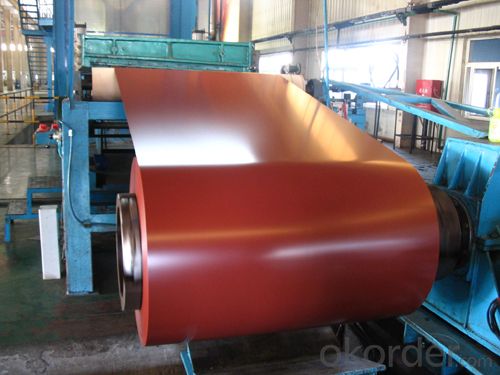
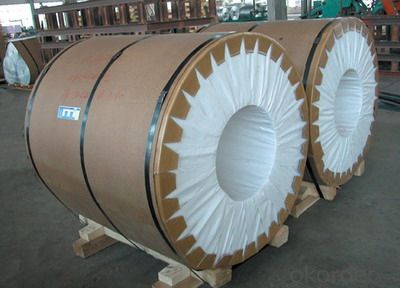
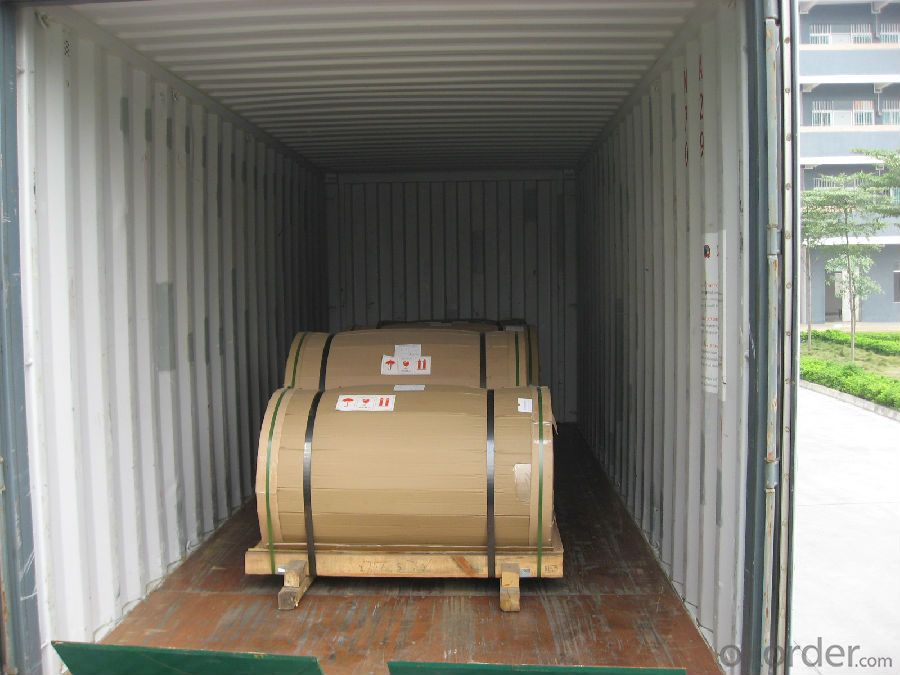
Aluminium Coil with PVDF Coating Good Quality Specification:
Alloy | A1100,A3003,A1050,A8011 etc |
Temper | H16,H18,H24 |
Thickness | From 0.024mm to 1.2mm |
Width | Standard width:1240mm |
Special width:1300mm,1520mm,1570mm,1595mm | |
Diameter | Standard dia:1200mm |
Interior dia:150mm,405mm,505mm | |
Weight | 2.5 T/coil,3.0 T/coil |
Coating | PE, PVDF, AC |
Surface | Embossed, mill finish, coated |
Color | AS to code RAL |
Gloss | 10-90%(EN ISO-2813:1994) |
Coating Thickness | PE: more than 18 micron |
PVDF: more than 25 micron | |
Coating Hardness (pencil resistance) | More than 2h |
Coating adhesion | 5J(EN ISO-2409:1994) |
Impact Resistance | No peeling or cracking(50 kg/cm,ASTMD-2794:1993) |
Flexibility (T-bend) | 2T |
MEK resistance | More than 100 |
FAQ Aluminium Coil with PVDF Coating Good Quality:
a.What is monthly capacity
---CNBM is one stated own company and our monthly capacity is about 2000tons.
b. Now which countries do you export your goods?
---Now we export to South East Asia,Africa, North America,South America ect.
- Q: What are the different slitting options for aluminum coils?
- There are several different slitting options available for aluminum coils, depending on the specific requirements and end use of the material. Some of the commonly used slitting options for aluminum coils include: 1. Single Slit: This is the most basic and widely used slitting option, where the aluminum coil is cut into two narrower coils with a single cut along the center. 2. Double Slit: In this option, the aluminum coil is cut into two narrower coils with two parallel cuts along the center, resulting in smaller widths for each coil. 3. Multi-Slit: This option involves cutting the aluminum coil into multiple narrower coils with multiple parallel cuts along the center. It allows for the production of several smaller coils from a single wider coil. 4. Ribbon Slit: This slitting option is used when the aluminum coil needs to be slit into very thin strips, often used in applications such as electrical wiring or packaging. 5. Oscillate Slit: This option is suitable for applications that require varying widths of aluminum strips. The coil is slit in a back-and-forth motion, allowing for flexibility in producing different widths. 6. Custom Slitting: Depending on the specific needs of a project, custom slitting options can be implemented. This involves tailoring the slitting process to achieve unique widths, lengths, or shapes of aluminum strips. It is important to consider the desired application, required dimensions, and the capabilities of the slitting equipment when choosing the appropriate slitting option for aluminum coils.
- Q: What do the two items (COIL:873347 HEAT: number) on the label of the raw material of aluminum coil stand for?
- COIL means aluminum coil and HEAT means heating, so together they mean hot rolled coil.
- Q: What are the typical delivery options for aluminum coils?
- The typical delivery options for aluminum coils include shipping via truck, rail, or ocean freight. Additionally, local pickup may also be available for customers located near the manufacturing facility or distribution center.
- Q: Can you create a tank, AFV, IFV etc. from aluminium or is this just a stupid idea that would kill everyone inside?
- Most military vehicles these days are made out of a super high grade strength linoleum. That way, if they're ever needed to be lifted out by a helicopter or some other flying vehicle, they're light enough. And it also is easier to repair damage and clean off blood stains as compared to other types of metal.
- Q: Four roller rolling mill roller bearing on the aluminum top how always have holes, in the production process, will be printed on just above the work roll, the work roll used in less than a day, it will produce a pothole, and aluminum plate will be printed from the upper supporting roller above the straight line, the line in the above there are holes.
- Well, typical aluminum plate surface defects in the backup roll print, solution, change support roll.
- Q: Why the end of the aluminum coil will have a yellow spot?
- Without coolant processing one, to see if there is no stain, so you can engage in removal of cooling liquid is not interference. Blank surface should have a layer of alumina film processing, heat, such conditions should make the cooling liquid and the alkaline layer friction reaction
- Q: What are the different types of aluminum alloy used in coil production?
- There are several different types of aluminum alloy used in coil production, each with its own unique properties and characteristics. Some of the most commonly used aluminum alloys in coil production include: 1. 1100 Aluminum Alloy: This type of alloy is known for its excellent corrosion resistance and high thermal and electrical conductivity. It is often used in applications where strength is not a primary concern, such as in food and beverage packaging. 2. 3003 Aluminum Alloy: This alloy is commonly used in coil production due to its moderate strength and good formability. It is often used in roofing and siding applications, as well as in the manufacture of HVAC components. 3. 5052 Aluminum Alloy: This alloy is known for its high strength and excellent corrosion resistance, making it ideal for use in marine and automotive applications. It also has good formability and is often used in the production of fuel tanks and body panels. 4. 6061 Aluminum Alloy: This alloy is a versatile and widely used aluminum alloy that offers a good balance of strength, formability, and corrosion resistance. It is commonly used in a variety of applications, including structural components, automotive parts, and aerospace components. 5. 7075 Aluminum Alloy: This alloy is known for its high strength-to-weight ratio and excellent fatigue resistance. It is often used in applications where strength and durability are critical, such as in the aerospace industry. These are just a few examples of the different types of aluminum alloys used in coil production. Each alloy has its own unique properties that make it suitable for specific applications, and manufacturers choose the appropriate alloy based on the desired characteristics of the final product.
- Q: How are aluminum coils coated to enhance their durability?
- Aluminum coils are coated using various methods to enhance their durability. One common method is the application of a protective coating, such as a polyester or acrylic resin, through a process called coil coating. This involves applying the coating to the surface of the aluminum coil using techniques like roll coating or spray coating. The coating acts as a barrier between the aluminum and external factors like moisture, UV rays, chemicals, and abrasion. It helps prevent corrosion, oxidation, and damage caused by environmental exposure. The type of coating and its thickness can vary depending on the desired level of durability and the intended application of the aluminum coil. In addition to protective coatings, aluminum coils can also undergo other treatments to further enhance their durability. These treatments may include pre-treatment processes like cleaning, etching, and chromating, which improve the adhesion of the coating to the aluminum surface. Other treatments may involve applying primers or topcoats to provide additional protection and improve the appearance of the coil. Overall, the process of coating aluminum coils enhances their durability by providing a protective layer that withstands harsh environmental conditions, extends their lifespan, and maintains their aesthetic appeal.
- Q: Is it advisable to purchase and utilize recycled aluminum coils without initial quality assessment?
- <p>No, it is not safe to buy and use recycled aluminum coils without first checking their quality. Recycled aluminum coils may have inconsistencies in thickness, strength, and purity, which can affect the performance and safety of the final product. It's crucial to inspect the coils for any defects, impurities, or deviations from the required specifications to ensure they meet the standards necessary for your application. Quality control is essential to prevent failures, maintain safety, and uphold the integrity of your manufacturing process.</p>
- Q: How would our life on planet earth be modified if there was no aluminum at all? Examples welcomed.
- Heavier. Technology would progress a lot slower because much of the stuff we take for granted is made possible by strong yet light materials such as aluminum.
Send your message to us
Wholesale Roofing Aluminum Coil - Aluminium Coil with PVDF Coating Good Quality
- Loading Port:
- Shanghai
- Payment Terms:
- TT OR LC
- Min Order Qty:
- 8 m.t.
- Supply Capability:
- 2000 m.t./month
OKorder Service Pledge
OKorder Financial Service
Similar products
Hot products
Hot Searches
Related keywords
